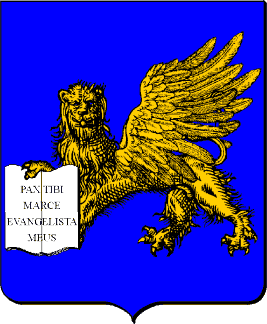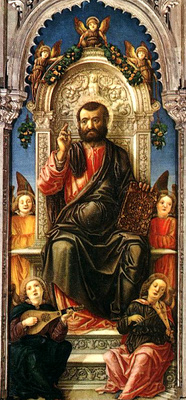Saint Mark
 Saint Mark, Evangelist
Saint Mark, Evangelist
1 Peter 5: 5b-14
Psalm 88: 2-3, 6-7, 16-17
Mark 16: 15-20
Mark and Peter
Tradition calls Saint Mark the interpreter of Saint Peter; clearly the relationship between Peter and Mark was both strong and tender. In today’s first reading, Saint Peter calls Mark “his son” (1 P 5:13), suggesting the gift and mystery of the Fisherman’s spiritual fatherhood in Christ. Mark was a son to Peter. Personally, I find in this a compelling reason to look confidently to Peter and his successors, and to remain attached to Peter and to his successor, today Pope Benedict XVI, as a son to his spiritual father. Mark laboured at Peter’s side, preaching the Gospel in Rome before carrying it to Venice and then to Alexandria where he gave his life for Christ. To this day the Churches of Rome, Venice, and Alexandria rejoice in the protection of Saint Mark and seek his intercession.
Be Not in Doubt for I am with Thee
Some of you may remember the coat of arms of Blessed John XXIII as Patriarch of Venice. It bore the inscription: Pax tibi, Marce, evangelista meus, “Peace to you, Mark, my evangelist!” I have always taken comfort in these words. They are personal, a kind of message to the heart. My great-great-grandmother was Venetian and would have known this motto well; to this day it is displayed with Saint Mark’s lion on the coat of arms and flag of Venice, La Serenissima. The text is not found in Sacred Scripture; it comes rather from the ancient “passion” of Saint Mark, the account of his martyrdom. The story goes that on the day of Pascha, after singing Mass, Saint Mark was seized, a rope was attached to his neck, and he was dragged through the city of Alexandria until his blood ran upon the stones. After this, he was imprisoned. An angel came to comfort him, and after the angel, the Lord Jesus himself came to visit and comfort Mark, saying, “Peace be to thee, Mark, my evangelist! Be not in doubt for I am with thee and shall deliver thee.” The following day Mark was put to death, thanking God, and repeating the words of the Crucified: “Into thy hands, Lord, I commend my spirit” (cf, Lk 23:46).
Saint Mark the Preacher
 The word “preaching” occurs in each of the three Proper prayers, the Collect, the Prayer Over the Offerings, and the Postcommunion. Mark was an Evangelist, not only as a writer of the second Gospel, but also as a preacher, spending himself, pouring himself out for Christ. In the Collect we beg for the grace to “deepen his teaching.” The Latin text says proficere which means to gain ground or to advance. This is what lectio divina is all about: gaining ground in the Gospel, penetrating ever more deeply the inexhaustible riches of the Word.
The word “preaching” occurs in each of the three Proper prayers, the Collect, the Prayer Over the Offerings, and the Postcommunion. Mark was an Evangelist, not only as a writer of the second Gospel, but also as a preacher, spending himself, pouring himself out for Christ. In the Collect we beg for the grace to “deepen his teaching.” The Latin text says proficere which means to gain ground or to advance. This is what lectio divina is all about: gaining ground in the Gospel, penetrating ever more deeply the inexhaustible riches of the Word.
Perseverance
In the Prayer Over the Gifts we ask that the Church may “ever persevere in preaching the Gospel.” The Church, like Saint Mark in his passion, needs the comforting presence of Christ who says, “Be not in doubt for I am with thee,” and she has that comforting presence always in the mystery of the Eucharist. The words of Christ to Saint Mark echo those given us in today’s Communion Antiphon: “Behold, I am with you always, even to the close of the age” (Mt 28:20).
The Most Holy Eucharist: Christ in Us
In the Postcommunion, we ask that what we have received from the altar may “sanctify us, and make us strong in the faith of the Gospel preached by Saint Mark.” This prayer instructs us on the dynamic relationship between the altar and the ambo or, if you will, between the Eucharist and the Gospel. We ordinarily think of the preaching of the Gospel as sending us to the altar, and preparing our hearts for the Holy Sacrifice, and rightly so. But today’s Postcommunion suggests something else as well. The Eucharist fulfills what the Gospel announces: the mystery of holiness, that is, “Christ in us, the hope of glory (Col 1:27).
The Eucharist makes us strong in the faith of the Gospel; it is our viaticum, food for the journey of faith, a remedy for every infirmity. The seed sown by holy preaching is made fruitful by the mysteries of Christ’s Body and Blood. Take away the altar, and the ambo stands in a void. The altar is the guarantee of that abiding presence of the comforting Christ who says to each of us today, as to Saint Mark, “Peace be to thee. . . . Be not in doubt, for I am with thee and shall deliver thee.”

Happy Feast Day, Don Marco!
God Bless You and Thank You for your contributions to our lives.
Happy and Holy Feast Day. Enjoy your celebrations,
Love
Mom and Dad
Pax tibi, Marce, and a blessed feast day as well!
Thanks so much for your posts.
+Dear Father,
May the Lord grant you every spiritual grace and heavenly blessing on your feast day! Our love and prayers are with you always, but especially today…
Dear Dom Mark,
Feast day blessings and greetings! As Saint Paul says, and it applies here, “I remind you to stir into flame the gift of God that you have through the imposition of my hands. For God did not give us a spirit of cowardice but rather of power and love and self-control.”
PAX
A blessed name-day to you, Don Marco. May you be richly rewarded for the help you give us toward “gaining ground in the Gospel.”
Don Marco,
Buon Onomastico!!!
May our Mother of Perpetual Help hold you always in her heart.
Remembering you in prayer,
Fr. Scott, C.Ss.R.
Happy Feast Day, Father!
Hi Father! What a lovely blog you have! I was reading your comment left at “Tea at Trianon” blog about the veil worn at Mass. I very much enjoyed what you said about, “wearing a veil to church need not go together with a grim, hard, heretic–freezing face.” haha! AMEN!! So true!
GOD BLESS!
-Michelle Therese in Scotland
Dear Father Mark,
Belated onomastico! I hope your day was lovely. I’ve been meaning to tell you that I’ll be in Rome next month for the canonisation until the middle of June. I hope that I can visit with you.
God bless.